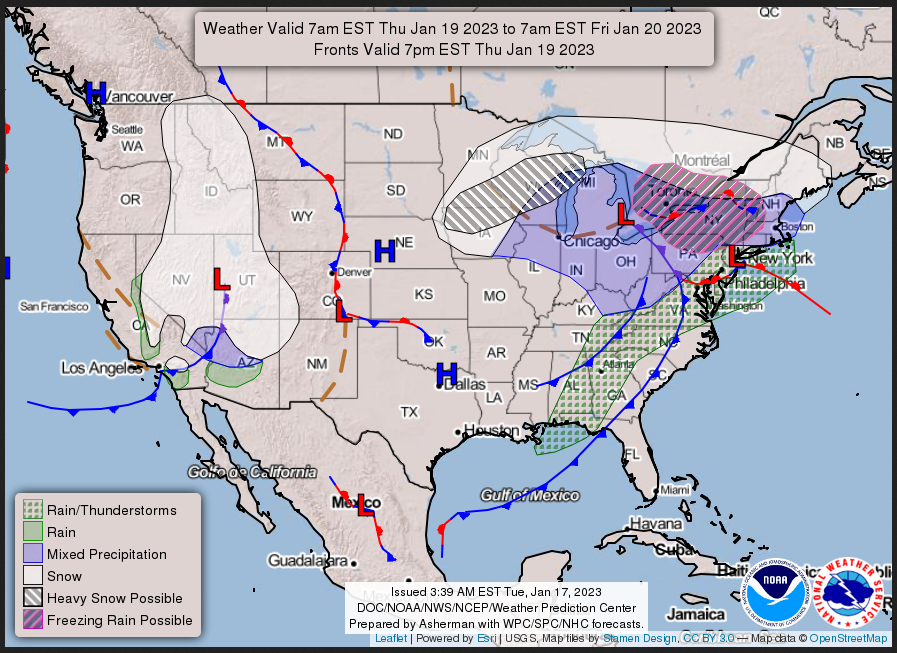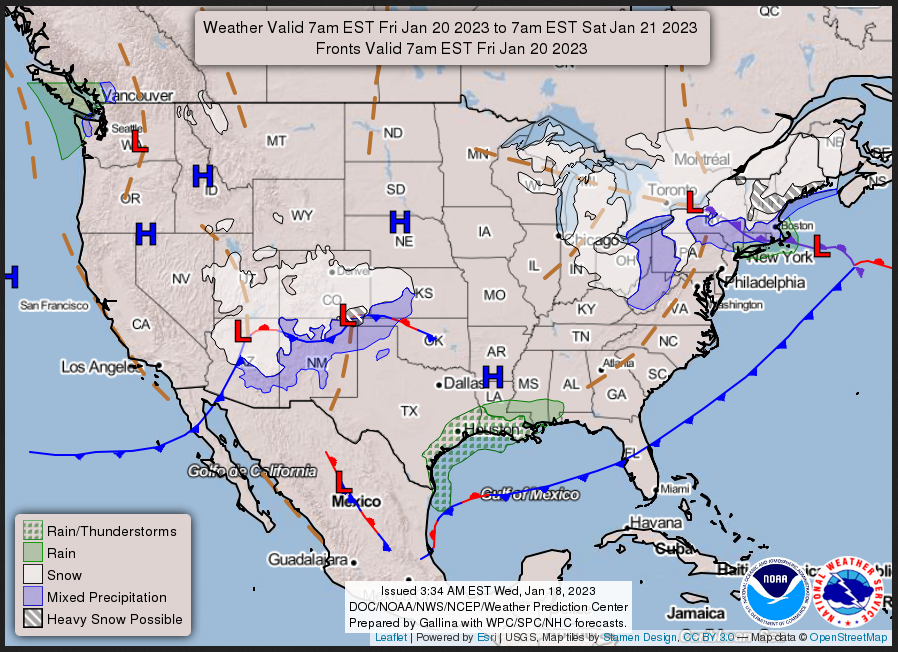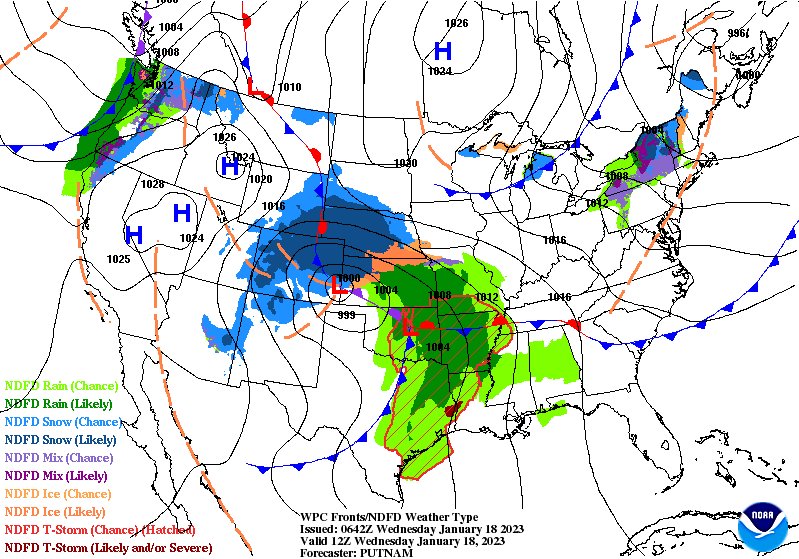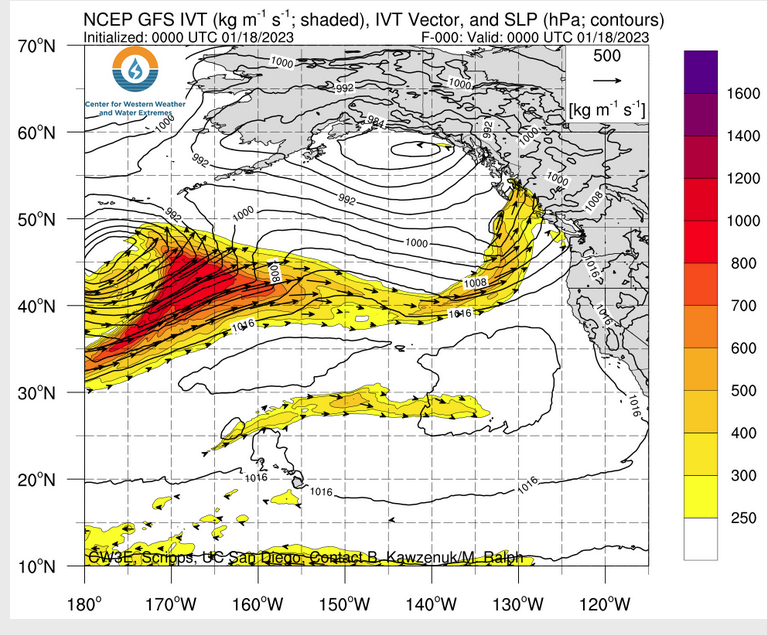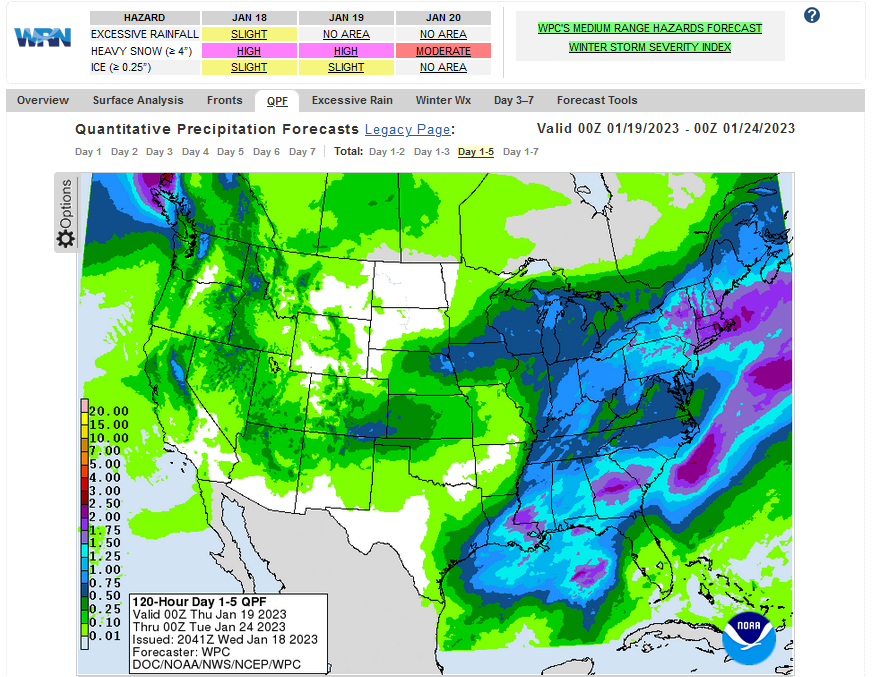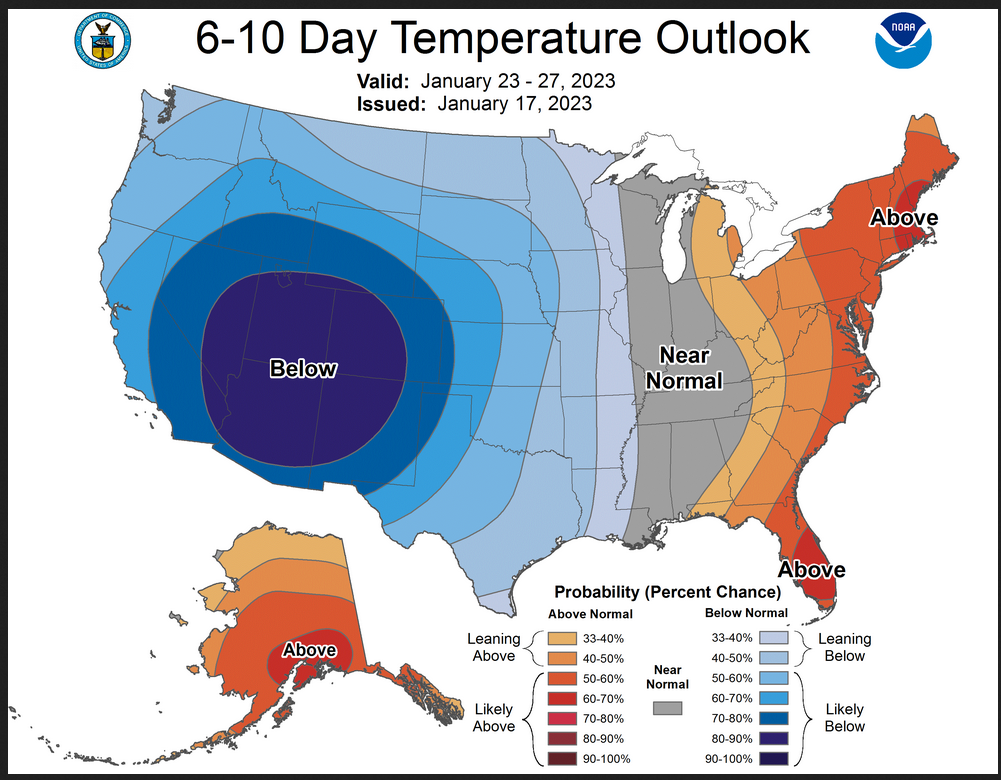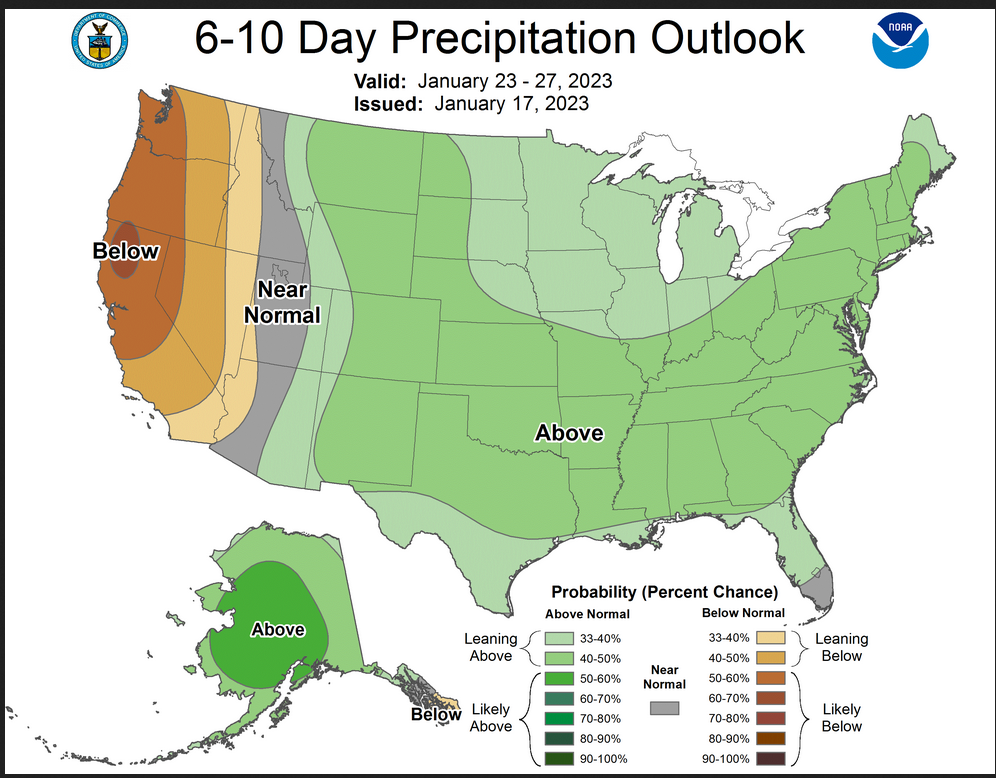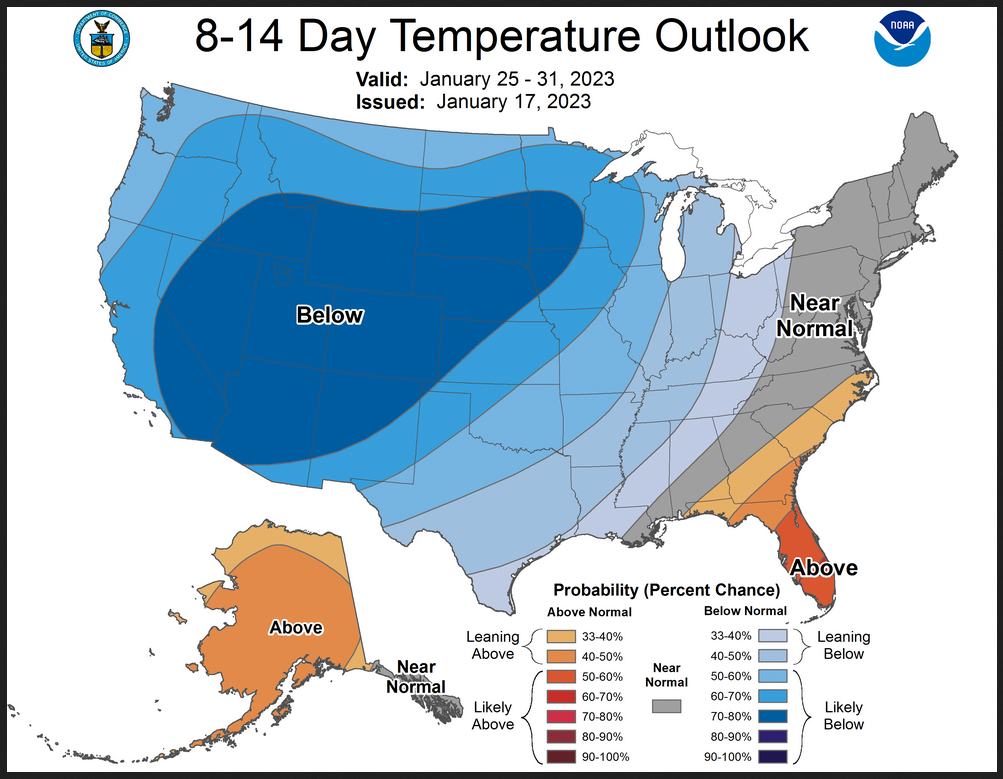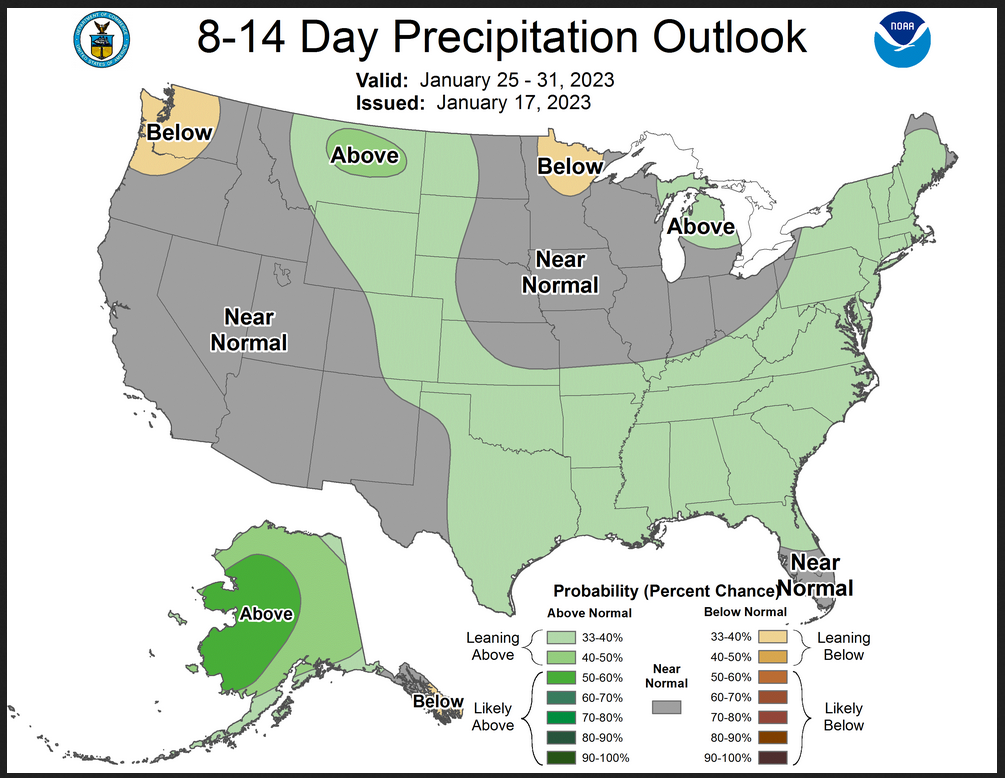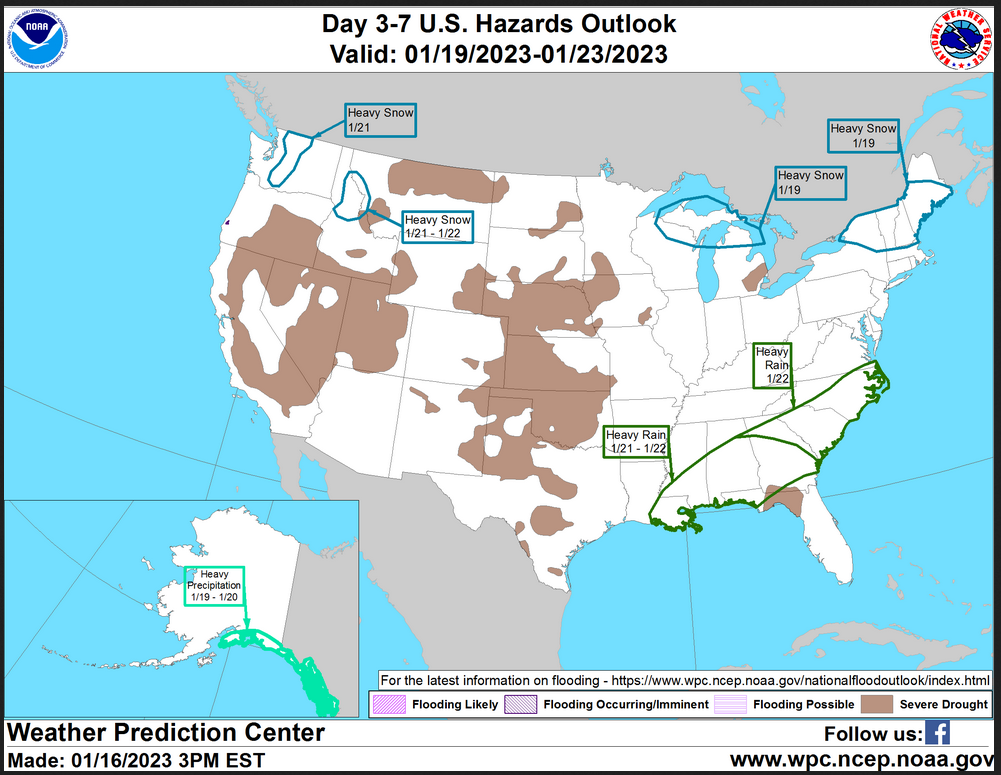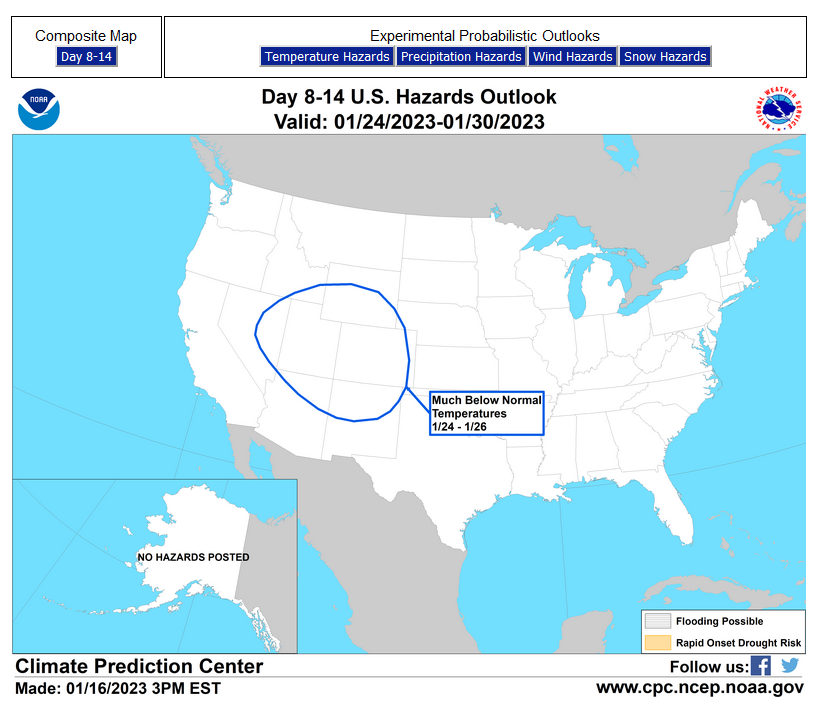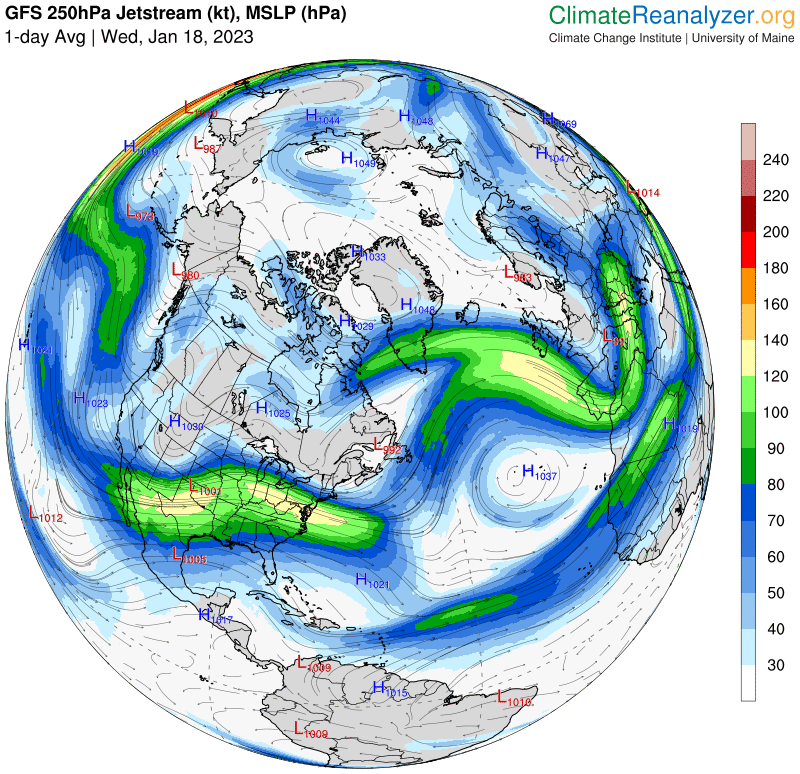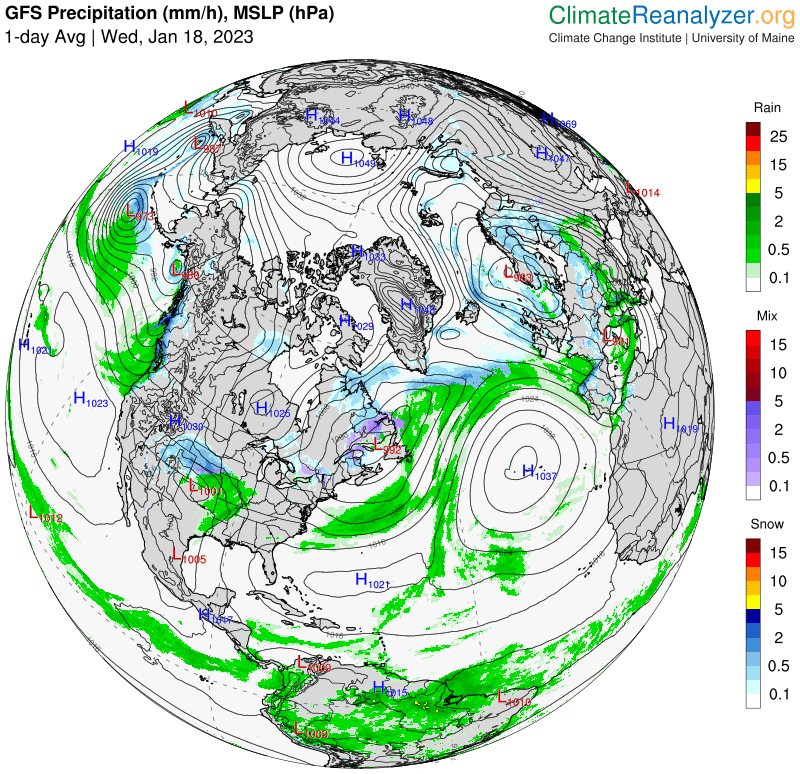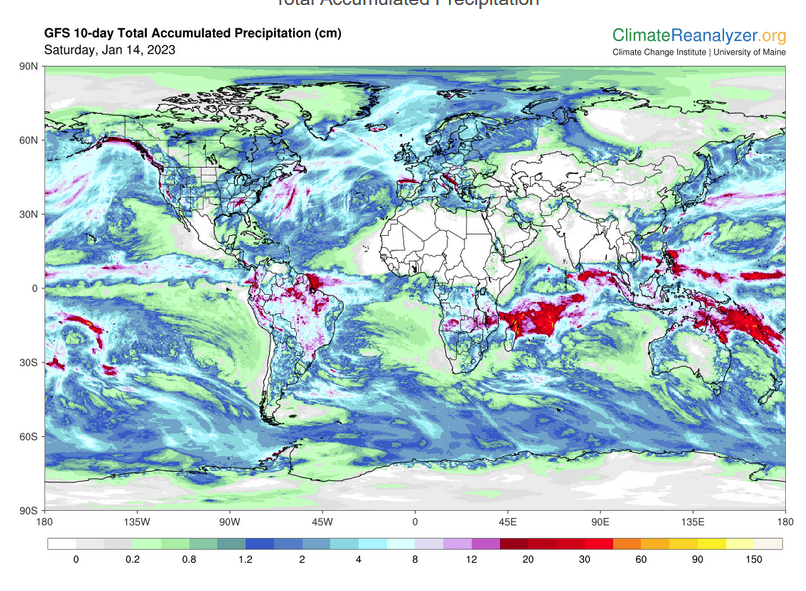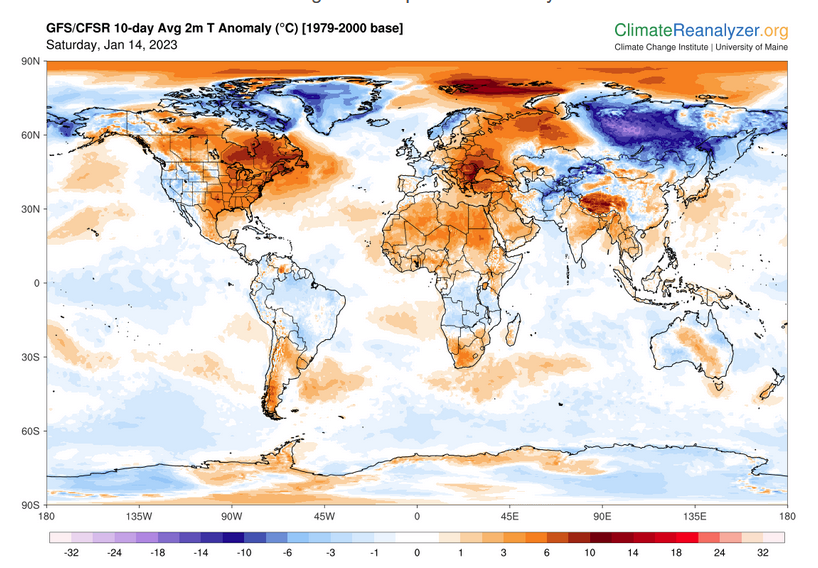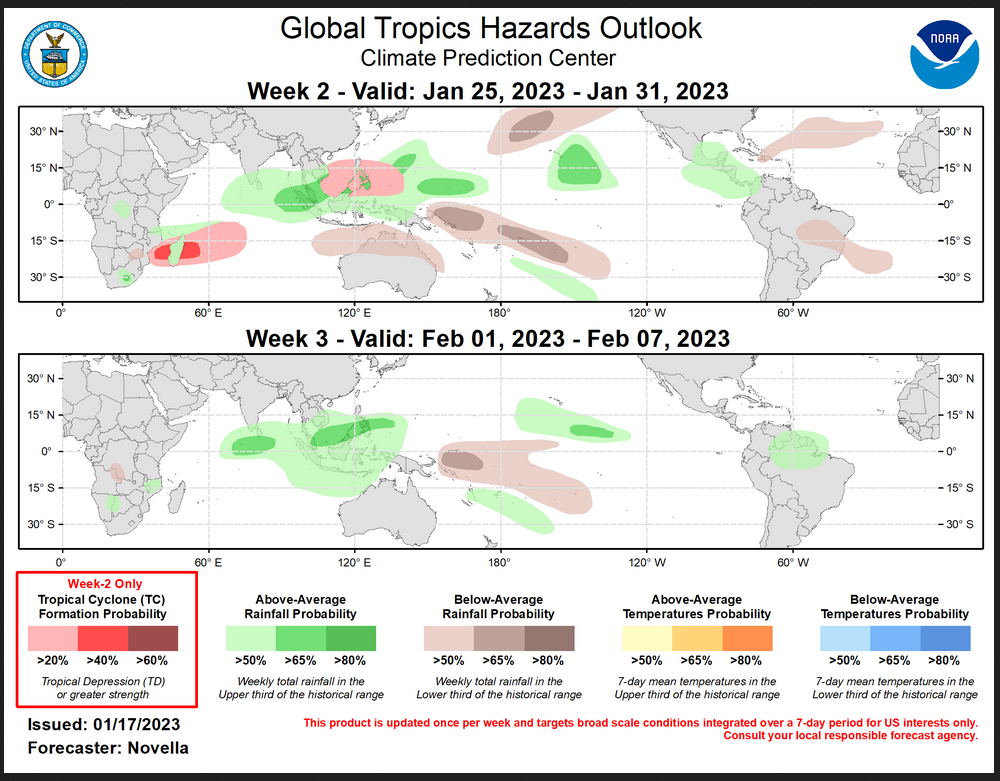Updated at 3:58 p.m. EST Wednesday, January 10, 2023
Here is what we are paying attention to in the next 48 to 72 hours. This article also includes World weather forecasts.
We start with the U.S. Information.
Short Range Forecast Discussion
NWS Weather Prediction Center College Park MD
335 PM EST Wed Jan 18 2023
Valid 00Z Thu Jan 19 2023 - 00Z Sat Jan 21 2023
...Heavy Snow from the Central Plains into the Upper Great Lakes and areas
of rain/freezing rain over parts of the Middle Mississippi Valley to parts
of the Northeast...
...There is a Slight Risk of severe thunderstorms and excessive rainfall
over parts of Middle/Lower Mississippi, Tennessee, and Western Ohio
Valleys through Thursday morning...
...There is a Slight Risk of severe thunderstorms over parts of the
Southeast on Thursday...
First, the 48-Hour Forecast (It is a 48 to 72 Hour Forecast actually)
Daily weather maps. I try to keep the below three maps updated. The Day 1 map updates twice a day and the Day 2 and 3 maps update only once a day. I will be doing the updating during the period described in the title of the article but if you happen to read this article later, you can get updates by clicking HERE.
WEDNESDAY AFTERNOON, EVENING, AND OVERNIGHT
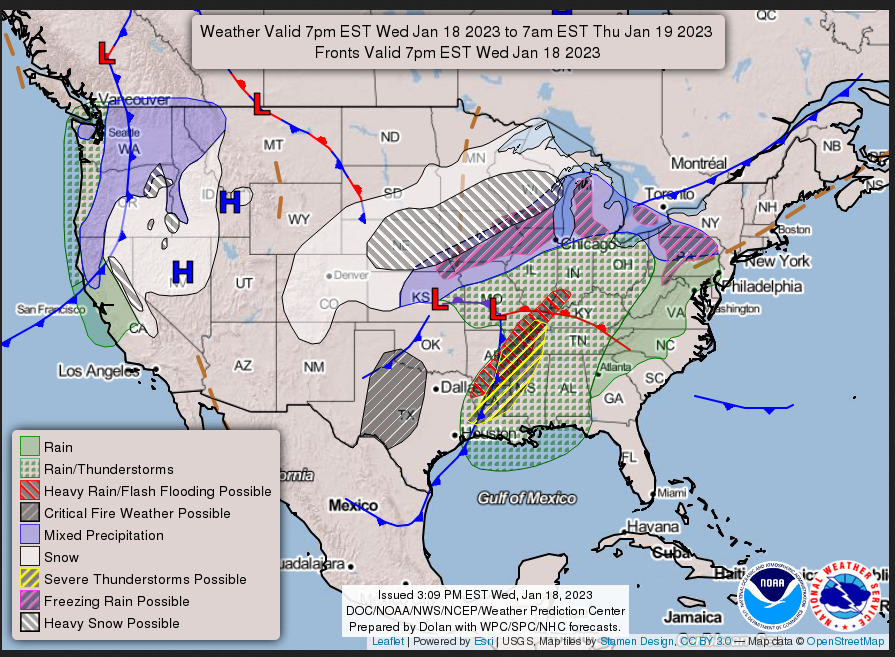 THURSDAY
THURSDAY
FRIDAY
This animation shows how things may play out over the next 60 hours. To update click here.
ATMOSPHERIC RIVERS
Continuation of the NWS Short Range Forecast (It is updated by NWS twice a day and these updates can be found here. We post at least one of those updates daily, sometimes both. The Highlights are shown in the lede paragraph of this article.
A strong storm over the Central Plains will move northeastward to the Great lakes by Thursday afternoon, then move off the Northeast Coast by Friday morning. The winter storm over Central Plains will track into the Great Lakes by Thursday with a mixture of heavy snow, sleet, and freezing rain. Snow and some ice will expand into the Northeast on Thursday and continue into Friday. Intense snowfall rates greater than 2 inches per hour are possible at times within the heaviest snow bands from Nebraska through northern Michigan. The heavy snowfall could result in additional snowfall exceeding 12 inches in some areas, producing event total snowfall in excess of 15 inches. These heavy snowfall rates combined with winds gusting up to 35 mph will result in dangerous travel due to blowing snow with near-zero visibility at times. An icy wintry mix of freezing rain and some sleet is likely from northern Kansas through southern Iowa. The icy wintry mix will produce slippery roads/sidewalks, with isolated power outages and tree damage also possible where the heaviest ice accumulates. This system will then move into the Northeast Thursday night through Friday night. Heavy snow rates of 1 plus inches per hour will create dangerous travel early Friday morning across New England, with lighter snows continuing through much of Friday. Furthermore, freezing rain may lead to ice accumulations of more than 0.1 inches, especially in the Catskills and Berkshires, leading to slippery travel. Furthermore, the system will produce showers and severe thunderstorms from parts of the Ohio Valley to the Lower Mississippi Valley. Therefore, the SPC has issued a Slight Risk of severe thunderstorms over parts of the Middle/Lower Mississippi, Tennessee, and Western Ohio Valleys through Thursday morning. The hazards associated with these thunderstorms are frequent lightning, severe thunderstorm wind gusts, hail, and a few tornadoes. Accompanying the thunderstorms will be heavy rain. Therefore, the WPC has issued a Slight Risk of excessive rainfall with these thunderstorms over parts of the Middle/Lower Mississippi, Tennessee, and Western Ohio Valleys through Thursday morning. The associated heavy rain will create mainly localized areas of flash flooding, with urban areas, roads, and small streams the most vulnerable. The area of severe thunderstorms will cover a much smaller area on Thursday. Therefore, the SPC has issued a Slight Risk of severe thunderstorms over parts of the Ohio Valleys from Thursday into Friday morning. The hazards associated with these thunderstorms are frequent lightning, severe thunderstorm wind gusts, hail, and a few tornadoes. However, the threat of excessive rainfall ends on Thursday. Meanwhile, a front moves into the Pacific Northwest, producing coastal rain and higher-elevation snow over the Pacific Northwest and Northern California. The rain will end over the Northwest/Northern California Coast on Wednesday. The snow will move into the Northern Intermountain Region and the Great Basin. On Thursday, the rain and higher-elevation snow will move southward from Central California to parts of Southern California by late Thursday afternoon. The rain and snow will end over California by Friday morning. Overnight Thursday, the snow over parts of the Great Basin will move into parts of the Southwest by Friday morning. By Friday evening, the snow will expand into parts of the Central/Southern Rockies.
Below is the current five-day cumulative forecast of precipitation (Updates can be found HERE)
Now we look at Intermediate-Term “Outlook” maps for three time periods. Days 6 – 10, Days 8 – 14, and Weeks 3 and 4. An outlook differs from a forecast based on how NOAA uses these terms in that an “outlook” presents information as deviation from normal and the likelihood of these deviations.
Below are the links to obtain updates and additional information. They are particularly useful if you happen to be reading this article significantly later than when it was published. I always try to provide readers with the source of the information in my articles.
HAZARDS OUTLOOKS
Click here for the latest complete Day 3 -7 Hazards forecast which updates only on weekdays. Once a week probably Monday or Tuesday I will update the images. I provided the link for readers to get daily updates on weekdays. Use your own judgment to decide if you need to update these images. I update almost all the images Friday Night for the weekend edition of this Weather Report. So normally readers do not need to update these images but if the weather is changing quickly you may want to.
Month to Date Information
Temperature month to date can be found at https://hprcc.unl.edu/products/maps/acis/MonthTDeptUS.png
Precipitation month to date can be found at https://hprcc.unl.edu/products/maps/acis /MonthPNormUS.png
World Forecast
Below are the current precipitation forecast and the 10-Day forecasts for temperature and precipitation. Updates and additional information can be obtained HERE
Much of this information is provided by the University of Maine. They draw upon many different sources.
This graphic updates on Tuesdays) If it has not been updated, you can get the update by clicking here Readers will only have to do that if they are reading this article much later than the date of it being published.
–
| I hope you found this article interesting and useful. |

